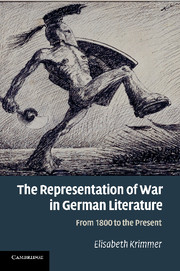Book contents
5 - The First World War: overview
Published online by Cambridge University Press: 06 July 2010
Summary
As the last part has shown, the twentieth century was not the first to endow war with sublime qualities. However, in the eighteenth and early nineteenth centuries the notion that war is ennobling and fortifying does not form the core of discourses about war and peace nor was it developed into a fully formed theory. By the end of the nineteenth century, in contrast, the celebration of war no longer occupies the fringes of a discourse on peace, but becomes a historical force in its own right.
The philosopher whose name is most associated with the glorification of war is Friedrich Nietzsche. In Zur Genealogie der Moral (On the Genealogy of Morality, 1887), Nietzsche identifies war with a heightened form of life, whereas peace is a symptom of decline (“Symptome des absinkenden Lebens,” v: 403). In Also sprach Zarathustra (Thus Spoke Zarathustra, 1883–5), war is not only meaningful in and of itself, it is also capable of endowing the world with meaning: “Ihr sagt, die gute Sache sei es, die sogar den Krieg heilige? Ich sage euch: der gute Krieg ist es, der jede Sache heiligt” (iv: 59) (You say it is the good cause that sanctifies even war? I tell you: it is the good war that sanctifies every cause). Nietzsche proclaims that war is man's true purpose on earth: “Der Mann soll zum Kriege erzogen werden und das Weib zur Erholung des Kriegers: alles Andere ist Thorheit” (iv: 85) (Man is to be educated for war and woman for the relaxation of the warrior: everything else is foolishness).
- Type
- Chapter
- Information
- The Representation of War in German LiteratureFrom 1800 to the Present, pp. 65 - 70Publisher: Cambridge University PressPrint publication year: 2010



